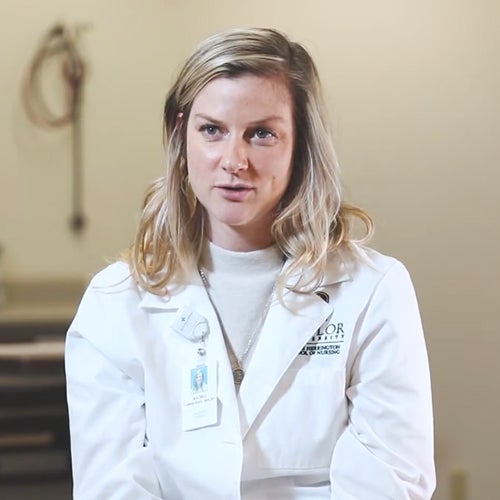You Belong Here: Overcoming Imposter Syndrome as a DNP Student

Feeling a mix of excitement and uncertainty about starting a Doctor of Nursing Practice (DNP) program is completely normal. Nurse imposter syndrome is a likely factor.
Imposter syndrome is a persistent pattern of self-doubt. It makes you question whether you deserve your achievements, worry whether your success is legitimate, and fear being “found out” as a “fraud.”
When nurse imposter syndrome takes over, you may hesitate to pursue career growth opportunities like a DNP degree. Earning a DNP will prepare you to expand your autonomy and provide higher levels of care. Yet, many nurses hesitate to pursue a DNP because of the rigor.
Fortunately, there are practical ways to overcome your nurse imposter syndrome and build your confidence to succeed in a DNP program. Keep reading to explore five strategies for challenging self-doubt so you can grow your impact through advanced nursing practice.
1. Acknowledge the Feeling of Nurse Imposter Syndrome
Imposter syndrome affects many people, including up to 82% of the general population. For nurses, the rates can be even higher. Studies have shown that 85.5% of nursing students and 77% of practicing nurses report feeling like imposters, making nurse imposter syndrome a widespread challenge.
The first step in overcoming nurse imposter syndrome is becoming aware of how it shows up for you. Imposter feelings can look different for everyone.
There are five common types of imposter syndrome, each with its own internal script that can hold you back from pursuing advanced nursing education:
- Perfectionist: Doubting your abilities unless everything you do is flawless. “If I’m not 100% prepared for every challenge in a DNP program, I’ll fail.”
- Expert: Feeling like you’re not good enough or questioning your abilities because you don’t know everything. "Until I master every aspect of my current role, I don’t deserve to pursue a DNP."
- Natural Genius: Believing you’re not capable if something feels difficult or doesn’t come naturally. "If the idea of pursuing a DNP feels this intimidating, I’m not meant for advanced practice nursing."
- Soloist: Feeling shame or resentment when asking for help or advice because you think you should handle everything alone. "I shouldn’t start a DNP program unless I can manage it on my own."
- Superhuman: Believing you can or should do more because it means you're successful. "If I can’t juggle my current job, personal life and a DNP program flawlessly, I shouldn’t even start."
A DNP program will challenge you to learn and grow outside of your comfort zone. Recognizing your imposter feelings is how you can begin reframing them to build the confidence for the highest level of nursing practice.
It's also important to recognize that nurse imposter syndrome can come in waves, no matter how long you've practiced in healthcare. Jasmine J. Mosley, DNP, FNP-C, a nurse practitioner and graduate of Baylor University's online DNP program, described this feeling not as a setback but as a reminder of the importance of lifelong learning in nursing.
"[Imposter syndrome] should be used to ensure you appreciate the ever-changing landscape of healthcare, the variability of evidence-based decision-making, and the necessity of continuous learning and professional development," Mosley said. "Advanced degree programs do not guarantee we'll have all the answers upon completion, but that we'll have the tools necessary to analyze scholarly evidence, critically think and problem solve, perform the skills we have obtained, and uplift the community around us."
Becoming aware of imposter feelings allows you to continue developing the skills for increasingly effective leadership in nursing.
2. Reframe Negative Self-Talk
Negative self-talk is a common aspect of nurse imposter syndrome. It refers to thinking about yourself in a critical or discouraging manner, focusing on your mistakes and inadequacies.
For early-career nurses, negative thoughts like these are common:
- “If I ask for help, it means I’m incompetent.”
- “Making even a minor mistake means I’m not ready for advanced nursing practice.”
- “Competent nurses don’t get overwhelmed.”
Negative self-talk can hurt your self-esteem. If you don’t learn to challenge it, you may lack the confidence and motivation to work toward your career goals. Negative self-talk can hold you back, not because of your ability, but because of your beliefs.
Neutral thinking is one way to reframe negative self-talk. It transforms negative thoughts into realistic ones, allowing you to embrace growth opportunities with greater confidence.
Here are examples of how to reframe negative thoughts into neutral thoughts:
|
Negative Thought |
Neutral Thought |
|
"I’ll never be able to handle a DNP program workload because I’m already overwhelmed as it is." |
"Earning a DNP will be challenging, but I’ll learn strategies for how to prepare for a DNP program, just like I did when I earned my nursing degree.” |
|
"I’m not smart enough for a doctorate. I’ll probably fail out." |
"DNP programs are rigorous, but I can take it one step at a time and ask for support when I need it." |
|
“Everyone else applying for DNP programs probably has more experience." |
"Everyone’s path is different. I have unique goals, experience, and learning opportunities." |
Reframing negative thoughts in a neutral way challenges nurse imposter syndrome by changing the focus of self-talk from perfection, inadequacy, and comparison to facts, problem-solving, and progress.
3. Lean on Your Support System
When you lean on your support system, you won't have to face nurse imposter syndrome alone. Instead of keeping doubts to yourself, you’ll build confidence and resilience through the encouragement, mentorship, and shared experiences of others.
Connecting with nursing professionals, your DNP program advisors, and peers will provide you with reassurance from those familiar with the DNP journey.
Professional Nursing Communities
One valuable source of support during your DNP program is connecting with nursing professionals through groups and organizations. They can help you see yourself as part of the next generation of nursing leaders.
Communities like these can offer guidance and real-world examples of success from advanced practice nurses who have been where you are:
- American Association of Nurse Practitioners (AANP)
- American Nurses Association (ANA)
- National Organization of Nurse Practitioner Faculties (NONPF)
Many of these organizations also have state or regional chapters, giving you access to local support.
DNP Program Student Success Coaches
Baylor University’s Louise Herrington School of Nursing offers an online DNP program with six specialty advanced practice tracks. Regardless of your track, you will receive personalized support and guidance throughout your DNP journey from a dedicated Student Success Coach.
If you want to hear from a DNP graduate about this experience, Rachel Berry, DNP, APRN, FNP-C, shared how meaningful the support was during her time at Baylor.
“Having her follow up [about my questions] and ask questions and be a resource has been incredibly encouraging,” Berry said. “I would say it’s been very helpful.”
EAs for Baylor’s DNP program meet with students weekly to help them stay organized and meet program expectations every step of the way. With decades of experience, Student Success Coaches are well-equipped to help students succeed.
DNP Program Peers
Leveraging peer support during your DNP program will help you realize that you’re not alone in your uncertainty. Talking openly with your peers helps normalize any challenges, offers encouragement, and creates a space for growth rather than comparison.
4. Reconnect with Your Purpose
Another practical way to overcome nurse imposter syndrome is to reconnect with your purpose for earning a DNP. You can transform self-doubt into motivation by focusing on why you want to pursue the highest level of nursing education.
Ask yourself:
- Do I want to lead healthcare teams?
- Do I want to drive system-level change?
- Do I want to advance health equity?
Whatever your purpose, it will remind you that your long-term goals are more meaningful than temporary uncertainty. You go from thinking, “I’m not ready” to realizing, “Earning a DNP is how I can prepare to be an effective leader at the highest level of nursing practice.” This preparation is why a DNP program makes you competitive in today’s evolving healthcare landscape.
For Baylor graduate Rachel Berry, earning a DNP expanded her leadership skills, provided holistic and advanced clinical training, and deepened her knowledge of healthcare innovation and business.
“These skills are invaluable and have helped to better prepare me for the huge responsibility and privilege that being a nurse practitioner affords,” Berry said.
If you’re feeling imposter syndrome about earning your DNP, reconnect with your “why.” Rather than questioning whether you belong in a DNP program, focus on the impact you’re committed to making as a nursing leader with a DNP.
5. Embrace the Learning Curve
Many nurses believe they should already have all the answers before pursuing a DNP. In reality, DNP programs are designed to stretch your knowledge and skills.
Feeling uncertain or uncomfortable is a sign that you’re growing, not falling short of expectations. Instead of thinking, “I need to have it all figured out before I start,” remind yourself, “I’m here to learn, and every challenge is part of the process.”
Baylor DNP graduate Rachel Berry shared how this shift unfolded for her. Before starting her program, she sometimes struggled to see how symptoms connected to disease processes.
“I didn't completely understand how and why they connected,” Berry said. “Throughout my time at Baylor, I became a better diagnostician, which helped groom me to become a well-rounded clinician.”
Berry’s experience demonstrates that expertise builds incrementally. By normalizing the learning curve, you permit yourself to grow into your full leadership potential.
Prepare to Lead at the Highest Level of Nursing Practice with an Online DNP from Baylor University
If you’re a nurse experiencing imposter feelings, you’re not alone—and you can overcome self-doubt so it doesn’t limit your goals or growth. By tapping into the strategies in this blog post, you can build the confidence to take the next step in your nursing career.
Earning a DNP is a valuable step toward realizing your leadership potential. If you’re ready to expand your impact in healthcare, Baylor’s online DNP program can help you pursue your ideal career.
So, why choose Baylor? Baylor’s Louise Herrington School of Nursing is accredited by the Commission on Collegiate Nursing Education (CCNE) and recognized as one of the top educational institutions in the nation. In Baylor’s online DNP program, you will learn from nationally recognized faculty, receive clinical placement support, and complete coursework entirely online so you can continue working.
Each of the six specialty advanced practice tracks in Baylor’s online DNP program educates nurses at the highest level of nursing practice. As a graduate, you will be prepared to become an exemplary nursing leader who can shape and improve patient outcomes, policy, processes, and the future of nursing.
For more information, get your free DNP program guide today.


